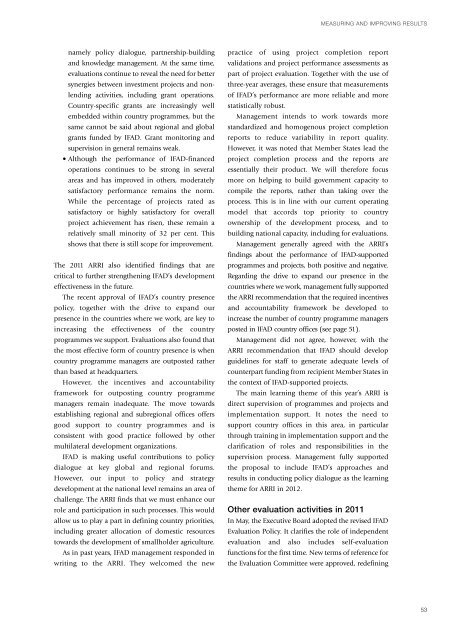ANNUAL REPORT 2011 - IFAD
ANNUAL REPORT 2011 - IFAD
ANNUAL REPORT 2011 - IFAD
You also want an ePaper? Increase the reach of your titles
YUMPU automatically turns print PDFs into web optimized ePapers that Google loves.
namely policy dialogue, partnership-building<br />
and knowledge management. At the same time,<br />
evaluations continue to reveal the need for better<br />
synergies between investment projects and nonlending<br />
activities, including grant operations.<br />
Country-specific grants are increasingly well<br />
embedded within country programmes, but the<br />
same cannot be said about regional and global<br />
grants funded by <strong>IFAD</strong>. Grant monitoring and<br />
supervision in general remains weak.<br />
• Although the performance of <strong>IFAD</strong>-financed<br />
operations continues to be strong in several<br />
areas and has improved in others, moderately<br />
satisfactory performance remains the norm.<br />
While the percentage of projects rated as<br />
satisfactory or highly satisfactory for overall<br />
project achievement has risen, these remain a<br />
relatively small minority of 32 per cent. This<br />
shows that there is still scope for improvement.<br />
The <strong>2011</strong> ARRI also identified findings that are<br />
critical to further strengthening <strong>IFAD</strong>’s development<br />
effectiveness in the future.<br />
The recent approval of <strong>IFAD</strong>’s country presence<br />
policy, together with the drive to expand our<br />
presence in the countries where we work, are key to<br />
increasing the effectiveness of the country<br />
programmes we support. Evaluations also found that<br />
the most effective form of country presence is when<br />
country programme managers are outposted rather<br />
than based at headquarters.<br />
However, the incentives and accountability<br />
framework for outposting country programme<br />
managers remain inadequate. The move towards<br />
establishing regional and subregional offices offers<br />
good support to country programmes and is<br />
consistent with good practice followed by other<br />
multilateral development organizations.<br />
<strong>IFAD</strong> is making useful contributions to policy<br />
dialogue at key global and regional forums.<br />
However, our input to policy and strategy<br />
development at the national level remains an area of<br />
challenge. The ARRI finds that we must enhance our<br />
role and participation in such processes. This would<br />
allow us to play a part in defining country priorities,<br />
including greater allocation of domestic resources<br />
towards the development of smallholder agriculture.<br />
As in past years, <strong>IFAD</strong> management responded in<br />
writing to the ARRI. They welcomed the new<br />
MEASURING AND IMPROVING RESULTS<br />
practice of using project completion report<br />
validations and project performance assessments as<br />
part of project evaluation. Together with the use of<br />
three-year averages, these ensure that measurements<br />
of <strong>IFAD</strong>’s performance are more reliable and more<br />
statistically robust.<br />
Management intends to work towards more<br />
standardized and homogenous project completion<br />
reports to reduce variability in report quality.<br />
However, it was noted that Member States lead the<br />
project completion process and the reports are<br />
essentially their product. We will therefore focus<br />
more on helping to build government capacity to<br />
compile the reports, rather than taking over the<br />
process. This is in line with our current operating<br />
model that accords top priority to country<br />
ownership of the development process, and to<br />
building national capacity, including for evaluations.<br />
Management generally agreed with the ARRI’s<br />
findings about the performance of <strong>IFAD</strong>-supported<br />
programmes and projects, both positive and negative.<br />
Regarding the drive to expand our presence in the<br />
countries where we work, management fully supported<br />
the ARRI recommendation that the required incentives<br />
and accountability framework be developed to<br />
increase the number of country programme managers<br />
posted in <strong>IFAD</strong> country offices (see page 51).<br />
Management did not agree, however, with the<br />
ARRI recommendation that <strong>IFAD</strong> should develop<br />
guidelines for staff to generate adequate levels of<br />
counterpart funding from recipient Member States in<br />
the context of <strong>IFAD</strong>-supported projects.<br />
The main learning theme of this year’s ARRI is<br />
direct supervision of programmes and projects and<br />
implementation support. It notes the need to<br />
support country offices in this area, in particular<br />
through training in implementation support and the<br />
clarification of roles and responsibilities in the<br />
supervision process. Management fully supported<br />
the proposal to include <strong>IFAD</strong>’s approaches and<br />
results in conducting policy dialogue as the learning<br />
theme for ARRI in 2012.<br />
Other evaluation activities in <strong>2011</strong><br />
In May, the Executive Board adopted the revised <strong>IFAD</strong><br />
Evaluation Policy. It clarifies the role of independent<br />
evaluation and also includes self-evaluation<br />
functions for the first time. New terms of reference for<br />
the Evaluation Committee were approved, redefining<br />
53

















